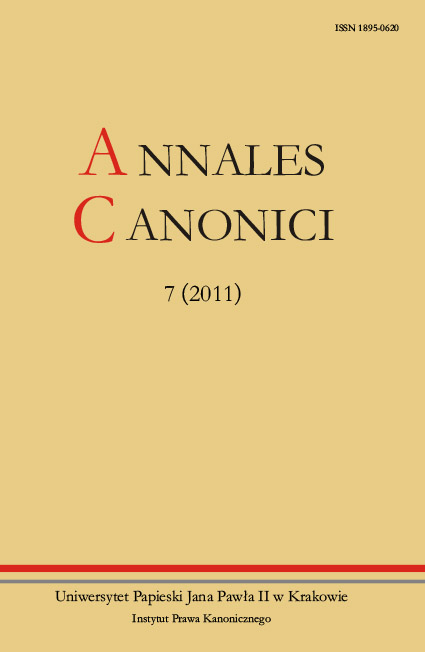Kontrowersje wokół definicji legalnej przywileju zawartej w kan. 76 § 1 Kodeksu Prawa Kanonicznego z 1983 roku
DOI:
https://doi.org/10.15633/ac.0707Abstrakt
The author of the presented study focused his attention on the issue of the doctrinal dispute over the introduction of a legal definition of a privilege included in in can. 79 § 1 CIC 1983.
According in the research performed, there is no longer a category of privileges of a general character in the current legal order since they can be now gained only through a separate administrative act. The act, however, is atypical since it us usually produced by the legislator. Taking into consideration the fact that in the canon system the separation of powers concentrates in one person, it should be assumed that the decision itself is made by the legislator through his executive power.
Mercy shown to person through the power of privilege does not in any case contradict the equality of the faithful in the community of the Church because through a decision of this type a competent authority wishes to come across the needs of someone who found himself in specific conditions.
The study also points out that the addresses of privilege can only be the members of the Catholic Church since non-Catholics are not within the jurisdiction of church legislator.
Pobrania
Opublikowane
Numer
Dział
Licencja

Praca jest udostępniana na licencji Creative Commons Attribution-NonCommercial-NoDerivatives 3.0 Unported License.
Autorzy publikujący w czasopiśmie udzielają jego wydawcy zgody o następującej treści:
- Autor zachowuje autorskie prawa majątkowe do utworu, a jednocześnie udziela wydawcy czasopisma zgody na jego pierwszą publikację w wersji drukowanej i wersji online na licencji Creative Commons Uznanie autorstwa 4.0 Międzynarodowe oraz zgody na wykonywanie opracowań, w tym przekładów.
- Autor ma możliwość udzielania zgody niewyłącznej na opublikowanie utworu w wersji, która ukazała się w czasopiśmie (np. zamieszczenia go w repozytorium instytucjonalnym lub opublikowania w książce), wraz z informacją o jego pierwszej publikacji w czasopiśmie.
- Autor może umieścić swój utwór online (np. w repozytorium instytucjonalnym lub na swojej stronie internetowej) jeszcze przed zgłoszeniem utworu do czasopisma.

